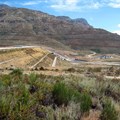City of Cape Town executive deputy mayor Ian Neilson today, 13 February, announced that Day Zero - when household taps in the city are to be turned off due to the ongoing water crisis - has been moved out to 4 June 2018.
The good news is due to the continued decline in agricultural usage, as announced last week, and also as a result of Capetonians reducing their water usage, said Neilson.
"Over the past week, consumption has been lowered to 526-million litres per day. This is the first time that the weekly average usage has remained under 550-million litres due to the city’s pressure management interventions and the efforts by our residents to use as little water as possible.
"Importantly, dam levels are at only 24,9% compared to 36,1% last year and 43,3% in 2016. Though the dam levels are much lower than a year ago, we have more information and more control over the system that supplies water to the city. Our continued interactions with the National Department of Water and Sanitation have led to much improved data-sharing and analysis, allowing for more reliable modelling and dramatically improved control over dam levels," explained Neilson.
Water usage reaches record low
He pointed out that in 2017, average water demand was 830-million litres per day with a 1,9% weekly change in dam levels. In 2016, demand was at more than one billion litres per day, resulting in a weekly change of 2,1%. Over the past weeek, dam levels have declined by 0,6%.
Neilson went on to thank the farming sector, particularly the Groenland Water Users’ Association for their water transfer to the Steenbras dam, and the National Department of Water and Sanitation for facilitating this supply injection.
For more information on the new tariffs that came into effect as of 1 February 2018, click here. Go to www.capetown.gov.za/thinkwater for all water-related information, including level 6B restrictions. View the Cape Town Water Map to see if your household is painting the city green to avoid Day Zero.

































